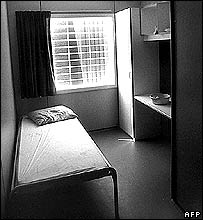
Inmates at the Scheveningen jail are carefully segregated
|
Claims by the late Slobodan Milosevic that he was being poisoned in his prison cell have thrown the spotlight on the Hague war crimes tribunal's jail. The former Yugoslav president, who died on Saturday, had been held there since 28 June 2001.
The Detention Unit was built in the mid-1990s within the confines of an existing Dutch government prison at Scheveningen, on the blustery North Sea coast of the Netherlands.
It has been described as the world's most luxurious prison, more a hotel than a jailhouse.
Each of the 47 inmates gets a single cell, complete with shower, toilet, washing basin, desk and chair.
They also get television in five languages, as well as satellite TV in their own tongue.
There are games rooms for darts, table tennis and board games, and lessons are offered in art and languages. A prison library is also provided, along with a courtyard for exercise.
A doctor is on permanent standby, along with a nurse and a psychologist, and several Dutch hospitals - among the world's most advanced - are within minutes of the prison gates.
And there is a room, the so-called "Comfort Room", which is closed off from the rest of the prison visiting area and its ubiquitous cameras.
Celebrity
It contains a bed and is reserved for conjugal visits, though whether Mr Milosevic ever made use of it, during the visits of his wife Mira Markovic, is a closely guarded secret.
 |
 It is overwhelmingly clear that the accused will do whatever is necessary to serve his own purposes It is overwhelmingly clear that the accused will do whatever is necessary to serve his own purposes 
|
There is a reason for all this comfort: when the prison was designed, the court's first president, Antonio Cassese, was determined to press home the idea that inmates are innocent until proven guilty. Once an inmate is found guilty, he is sent to another prison in a volunteering UN nation. No decision had been taken on where to send Mr Milosevic.
The jail was carefully segregated so that indictees who had fought against each other in the Balkan wars were kept apart.
Mr Milosevic was given extra facilities because of his insistence on running his own defence.
In addition to his cell he had an office, with his own key, containing desk, computer, fax and the internet. Among some Serb prisoners he was considered a celebrity and there were instances of men offering to iron his shirts.
Suicide
Suicide has been a problem at the jail. There are no cameras inside the cells, as it is a remand centre.
In June 1998, Slovko Dokmanovic, a former Serb officer, hanged himself with his tie from a wardrobe door.

Some inmates have access to more facilities than others
|
On 5 March this year, Milan Babic, a former leader of the Croatian Serbs, was found dead in his cell. However, the prison has recorded no break-outs and no violence between prisoners.
Officials say many prisoners leave the jail healthier than when they arrived. Smoking and alcohol are restricted, meals are carefully balanced and exercise is encouraged.
The chances of an outsider being able to poison Mr Milosevic were small. Tests are made on the food, visitors are searched, as is the mail.
But the reported discovery of a mystery substance in Mr Milosevic's blood is not new.
In the summer of 2004, blood tests revealed an unexpected substance in Milosevic's blood.
The tests had been ordered to find out why drugs prescribed for high blood pressure had had little effect.
Medication
Two doctors reported not only that there were no traces of the pills in his blood, but that traces of another drug were found.
"He is taking another drug," concluded a report by a Dr Dijkman on 26 August, 2004. "The other drug that has been taken without prescription and without supervision by the Detention Unit staff."
The report continued: "Since this drug is not on his medication list in his medical file, this means that Mr Milosevic must obtain this drug in another way."
It remains to be seen what that other way was, but tribunal prosecutors were in no doubt that Mr Milosevic was taking the pills himself, in order to worsen his health condition and derail the trial.
"He has been obtaining for his own purposes other drugs, no doubt to help himself," leading prosecutor Geoffrey Nice told trial judges in September that year. "This material makes it overwhelmingly clear that the accused will do whatever is necessary to serve his own purposes."

